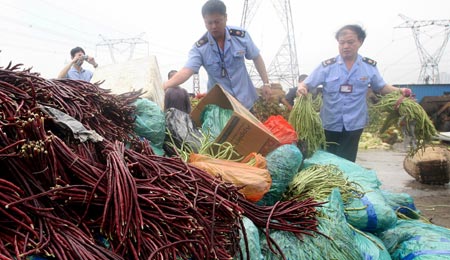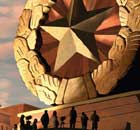Top Biz News
Loopholes in pesticide regulation
By WANG YAN and JIN ZHU (China Daily)
Updated: 2010-03-02 11:32
 |
Large Medium Small |
|
 |
|
Officers destroy 7.5 tons of cowpeas from Hainan province that contain toxic pesticide in Dongguan,Guangdong province, Sunday. PROVIDED TO CHINA DAILY |
As of Monday, isocarbophos - a highly toxic pesticide banned from use on fruits, tea, tobacco, vegetables and herbal plants - was detected on Hainan-grown cowpeas sold in several provinces across the country, including Hubei, Guangdong, Anhui and Jiangsu.
While isocarbophos was banned in Hainan in 2004, it has still been found on sale in some remote regions in the province, China National Radio reported on Monday.
Some insiders in Sanya said dealers would only sell the pesticide to acquaintances to avoid risks. Two bottles of isocarbophos cost 18 yuan ($2.60), while legal pesticides of the same effects cost 50 yuan, the report said.
"Due to the lack of effective supervision of pesticide sales, farmers can still get the banned ones fairly easily, which they prefer for their low prices," Sun Shubao, secretary-general of China Crop Protection Industry Association, told China Daily on Monday.
China's current regulation on the management of pesticides, issued in 1997, primarily focuses on the supervision of pesticides production. It does not address their sale and use, he said.
As a result, Sun said authorities are now considering revising the regulation.
According to Sun, many countries outside China strictly control the sale and use of highly-toxic pesticides.
| ||||
Current tests on pesticides in farm products are also weak in the country, said Sang Liwei, a food safety expert in Beijing.
"The tests are not compulsory. Farm products just go through some sample tests before entering local markets," Sang told China Daily on Monday.
"A test costs up to 3,000 yuan and the process takes two days. Without enough funding, it is impossible to carry out such tests on a large scale," Sang said.











